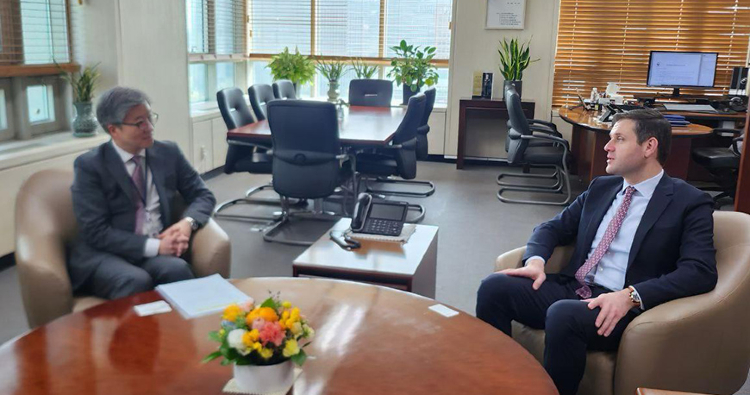Georgian, Korean deputy economy ministers discuss cooperation

Arveladze “positively assessed” the South Korean Government’s plans for opening the country’s Embassy in Georgia at the end of the year, and noted the establishment of the permanent diplomatic representation would “greatly benefit” partnership relations and contribute to “deepening of future people-to-people cooperation”. Photo: Ministry of Economy
Georgia’s Deputy Economy Minister Genadi Arveladze on Thursday met Kim Hee-sang, the Deputy Minister for Economic Affairs at the Ministry of Foreign Affairs of South Korea, to discuss trade and economic relations between the two countries.
The Georgian Ministry said the meeting, hosted during a Georgian delegation’s visit to South Korea, discussed trade, mutual protection of investments, energy, transport and logistics, as well as maritime transport, launch of air traffic, tourism and “other priority areas”.
The officials “positively evaluated” progress achieved within the ongoing negotiations on economic partnership, adding the talks included discussions of a free trade deal.
They also noted an agreement reached in the talks would give a “significant impetus” to the growth of bilateral trade and give Georgian exporters an opportunity to introduce their products to the South Korean market of about 50 million consumers.
The parties also discussed an agreement on mutual promotion of investments, noting the agreement would promote cooperation of the two countries in investments and increase the rapprochement of Georgian and South Korean business circles.
The meeting also covered the deepening cooperation in tourism, with the sides noting a launch of regular direct flights would further promote the growing interest of South Korean visitors in Georgia as an “attractive destination for tourism”.
The Georgian side pointed out a 191 percent increase in the number of visitors from South Korea to the country last year compared to 2022 and highlighted the 2021 agreement of airline connections between the two countries.
The officials agreed to hold the next session of the intergovernmental economic commission in Georgia’s capital Tbilisi by the end of this year with a view of further deepening economic relations between the two countries.
Arveladze “positively assessed” the South Korean Government’s plans for opening the country’s Embassy in Georgia at the end of the year, and noted the establishment of the permanent diplomatic representation would “greatly benefit” partnership relations and contribute to “deepening of future people-to-people cooperation”.
 Tweet
Tweet  Share
Share